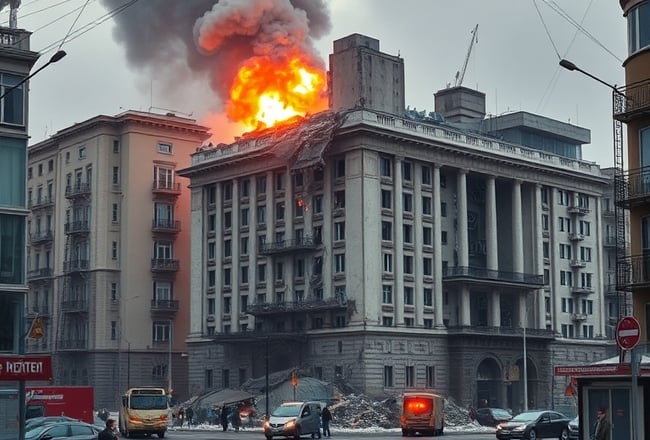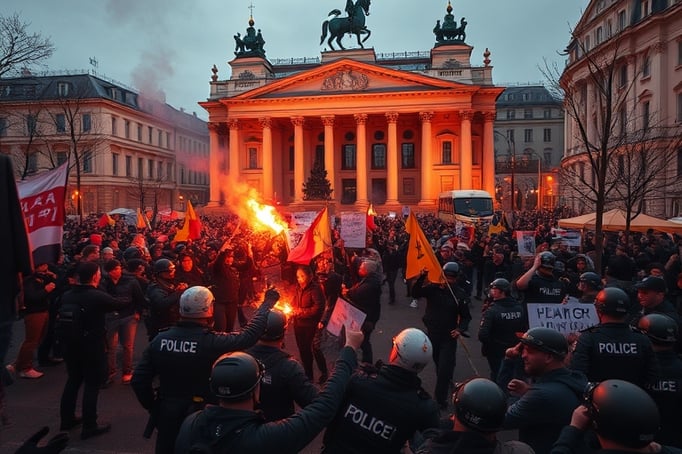Nuskia's Invasion of Žilibinov and Heightened Strife in Kielle
Tensions Resurface as Nuskia's Regional Ambitions Threaten Stability
FOREIGN AFFAIRSHEREIK NEWS
Carl Mysken
7/29/20003 min read




In 1989, Nuskia launched a devastating military invasion of the northern Kiellian town of Žilibinov, leaving an indelible mark on the region's history. The invasion, which lasted 54 days, resulted in the tragic loss of 54 civilian lives and the deaths of 109 national guardsmen deployed to defend the town. The world responded with outrage as nations across the continents of Yaslav, Glanha, and Alibrean condemned Nuskia’s aggression and called for an end to the violence. The conflict ended with Nuskia withdrawing its forces, but the scars of the occupation lingered in Žilibinov, a stark reminder of Nuskia's willingness to use force to assert its dominance.
The invasion of Žilibinov was a calculated move by Nuskia to send a clear message: its ambitions to reassert influence over its neighbors were alive and well. For Kielle, this was a moment of profound loss and a wake-up call about the dangers of its proximity to a powerful and assertive neighbor. In the years since the invasion, tensions between the two nations have only grown, with each diplomatic disagreement and political maneuver adding to the already volatile situation.
In the present year 2000, the shadow of Žilibinov looms large over Kielle and its people. Political unrest is rife as the nation faces significant internal and external pressures. Recent elections in Kielle, which were expected to usher in a leadership aligned with the aspirations of its western population, have instead sparked allegations of electoral manipulation. Despite predictions of a victory for parties favoring greater autonomy from Nuskia, the election saw the triumph of a faction widely viewed as sympathetic to Nuskian interests. This outcome has led to widespread protests, particularly in the western regions of Kielle, where citizens have accused the government of rigging the results to align with foreign interests.
The unrest has deepened existing divisions within Kielle, casting doubt on the country's ability to maintain a unified front against external threats. Protesters argue that the election was a betrayal of Kielle's sovereignty and independence, as many fear that the new government’s alignment with Nuskia could pave the way for greater influence from their powerful neighbor. The tensions have left Kielle in a precarious position, with its western population increasingly disillusioned by a political system that seems to favor external allegiances over domestic unity.
Adding to the unease, Nuskia has recently issued statements claiming that certain northern regions of Kielle are more culturally and historically tied to Nuskia than to Kielle itself. This rhetoric has further inflamed tensions, as many fear it may serve as a precursor to renewed attempts at territorial claims or interference. For the people of Žilibinov, these statements are a painful reminder of the town’s invasion over a decade ago and the devastation it brought. The suggestion that parts of Kielle belong more to Nuskia is seen by many as an affront to the nation’s sovereignty and an ominous sign of potential future aggression.
As Kielle navigates these turbulent waters, it faces the monumental task of balancing internal reform with external defense. The unresolved wounds of 1989 and the current political unrest have created a perfect storm of challenges that threaten to undermine the nation’s stability. The country’s ability to move forward will depend on its capacity to address the grievances of its citizens, protect its borders, and reaffirm its independence in the face of growing external pressures.
The world watches with bated breath as Kielle stands at a critical crossroads. The events of Žilibinov in 1989 serve as a grim reminder of how quickly tensions can escalate and the devastating consequences of unchecked aggression. As the nation grapples with its internal divisions and the shadow of its powerful neighbor, one thing is clear: Kielle’s fight for sovereignty is far from over. The coming years will test the resilience and resolve of its people as they strive to forge a future free from the specter of foreign influence and intervention.
